University of Auckland
The University of Auckland (Māori: Te Whare Wānanga o Tāmaki Makaurau) is a public research university in Auckland, New Zealand. The institution was established in 1883 as Auckland University College, a constituent college of the University of New Zealand. Today, the University of Auckland is New Zealand's largest university by enrolment, hosting about 40,000 students on five Auckland campuses.[5] The City Campus, in central Auckland, has the bulk of the students and faculties. There are eight faculties, including a law school, as well as three research institutes associated with the university.
Te Whare Wānanga o Tāmaki Makaurau | |
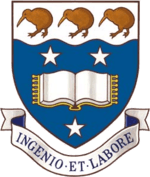 Coat of arms of the University of Auckland | |
| Motto | Latin: Ingenio et labore[1] |
|---|---|
Motto in English | By natural ability and hard work |
| Type | Public |
| Established | 1883; 137 years ago[1] |
| Chancellor | Scott St John[2] |
| Vice-Chancellor | Dawn Freshwater |
Academic staff | 2,183 (FTE, 2015)[3] |
Administrative staff | 2,892 (FTE, 2015)[3] |
| Students | 33,050 (EFTS, 2015)[3] |
| Undergraduates | 25,754 (EFTS, 2015)[3] |
| Postgraduates | 7,717 (EFTS, 2015)[3] |
| Location | , New Zealand |
| Campus | Multiple |
| Affiliations | ACU, APAIE, APRU, Universitas 21, WUN |
| Website | www.auckland.ac.nz |
 | |
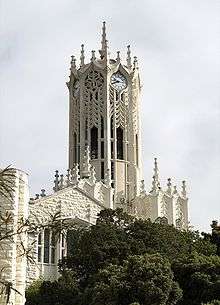
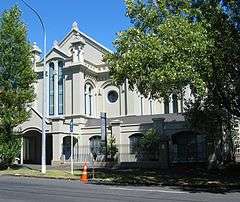
The University of Auckland is perennially ranked as the top academic institution in the country. It is the only New Zealand university in the QS's Top 100 rankings.
History
Origins
The University of Auckland began as a constituent college of the University of New Zealand, founded on 23 May 1883 as Auckland University College. Stewardship of the University during its establishment period was the responsibility of John Chapman Andrew (Vice Chancellor of the University of New Zealand 1885–1903). Housed in a disused courthouse and jail, it started out with 95 students and 4 teaching staff: Frederick Douglas Brown, professor of chemistry (London and Oxford); Algernon Phillips Withiel Thomas, professor of natural sciences (Oxford); Thomas George Tucker, professor of classics (Cambridge); and George Francis Walker, professor of mathematics (Cambridge). By 1901, student numbers had risen to 156; the majority of these students were training towards being law clerks or teachers and were enrolled part-time. From 1905 onwards, an increasing number of students enrolled in commerce studies.
Development of a research culture
The University conducted little research until the 1930s, when there was a spike in interest in academic research during the Depression. At this point, the college's executive council issued several resolutions in favour of academic freedom after the controversial dismissal of John Beaglehole (allegedly for a letter to a newspaper where he publicly defended the right of communists to distribute their literature), which helped encourage the college's growth.
In 1934, four new professors joined the college: Arthur Sewell (English), H.G. Forder (Mathematics), C.G. Cooper (Classics) and James Rutherford (History). The combination of new talent, and academic freedom saw Auckland University College flourish through to the 1950s.[1]
In 1950, the Elam School of Fine Arts was brought into the University of Auckland. Archie Fisher, who had been appointed principal of the Elam School of Fine Arts was instrumental in having it brought in the University of Auckland.
Making a name
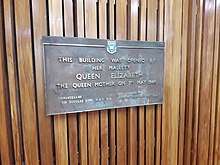
The University of New Zealand was dissolved in 1961 and the University of Auckland was empowered[6] by the University of Auckland Act 1961.
In 1966, lecturers Keith Sinclair and Bob Chapman established The University of Auckland Art Collection, beginning with the purchase of several paintings and drawings by Colin McCahon. The Collection is now managed by the Centre for Art Research, based at the Gus Fisher Gallery. The Stage A of the Science building was opened by Her Majesty Queen Elizabeth The Queen Mother on 3 May. In 1975-81 Marie Clay and Patricia Bergquist, the first two female professors, were appointed.[1]
Growth and consolidation

Queen Elizabeth II opened the new School of Medicine Building at Grafton on 24 March 1970. The Queen also opened the Liggins Institute in 2002.[7]
The North Shore Campus, established in 2001, was located in the suburb of Takapuna. It offered the Bachelor of Business and Information Management degree. The faculty was served by its own library. At the end of 2006, the campus was closed, and the degree relocated to the City campus.[8]
On 1 September 2004, the Auckland College of Education merged with the University's School of Education (previously part of the Arts Faculty) to form the Faculty of Education and Social Work.[9][10] The faculty is based at the Epsom Campus of the former college,[11] with an additional campus in Whangārei.[12]
Professor Stuart McCutcheon became Vice-Chancellor on 1 January 2005. He was previously the Vice-Chancellor of Victoria University of Wellington.[13] He succeeded Dr John Hood (PhD, Hon. LLD), who was appointed Vice-Chancellor of the University of Oxford.[14] On 16 March 2020, McCutcheon was succeeded by Professor Dawn Freshwater, the first female Vice-Chancellor in the University's history.[15]
The University opened a new business school in 2007, following the completion of the Information Commons. It has recently gained international accreditations for all its programmes and now completes the "Triple Crown" (AMBA, EQUIS and AACSB).[16]
In 2009, the University embarked on a NZ$1 billion 10-year plan to redevelop and expand its facilities.[17] The $240m Grafton Campus upgrade was completed in 2011.[18] In May 2013 the University purchased a site for new 5.2-hectare campus on a former Lion Breweries site adjacent to the major business area in Newmarket.[19] The Faculty of Engineering and the School of Chemical Sciences moved into the new faculties in 2015.[1] The NZ$200 million new Science Centre was opened in July 2017.[20] The NZ$280 million new Engineering Building was completed in 2019.[21] In 2017, work started on the building of a new $116m medical school building in Grafton Campus.[22] In 2019, work has begun with the redevelopment of the University Recreation Centre in the City Campus.[23][24] The University of Auckland has also built multiple student accommodation buildings, and it became the largest provider of student accommodation in New Zealand.[25]
Administration
The head of the University is the Chancellor, currently Scott St John,[2] however this position is only titular. The chief executive of the University is the Vice-Chancellor, currently Professor Dawn Freshwater, who is the University's sixth Vice-Chancellor,[26] and the first female to hold the role.
Coat of arms
The Blazon of the Arms of the University of Auckland is: Azure between three mullets argent an open Book proper edged and bound Or with seven Clasps on either side Or, on a chief wavy also argent three Kiwis proper.[27][1] Translation of the Blazon. The shield is the first part described "Azure" means blue so the shield is blue. A "mullet" is a five pointed star and when there are three of them they are depicted two above and one below. Their colour is silver ("argent".) Between these stars is an open book and "proper" means the book is shown in its natural colours – normally black and white. The edge ("edged") of the book and the binding of the book is in gold ("Or".) and it is bound with seven clasps on either side which would close the book securely when closed. These clasps are also gold. A "chief" is a broad strip at the top of the shield but "wavy" means that the base of the chief is in a wave like line. The colour of the chief is silver ("argent".) On the chief are three kiwis and "proper" means that they are shown in their natural colour.
The university's motto is Ingenio et labore which may be translated from Latin as "By natural ability and hard work."[1]
Admission
Since eliminating open entry in 2009,[28] all applicants must have a university entrance qualification. Domestic students are required to achieve the NZQA University Entrance Standard,[29] while international students must achieve an equivalent approved qualification in their country.[30] Admission to the University also requires applicants to meet the preset academic and English language entry requirements specific to the degree for which they are applying.[31] Some programmes also have a preset number of places available within the degree. To be guaranteed entry students must achieve a rank score as well as meet any additional requirements.[32]
All students who did not complete their high school education or equivalent in English are also required to provide a valid IELTS score (minimum of 6.0) or equivalent.[33]
Campuses and facilities
Campuses
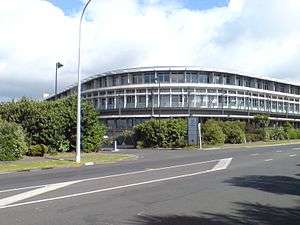
The University of Auckland has a number of campuses in Auckland, and one in Whangārei in the Northland Region.

- The City Campus in the Auckland CBD has the majority of the students and faculties. It covers 16 hectares and has a range of amenities including cafes, health services, libraries, childcare facilities and a sports and recreation centre.[34]
- The Tāmaki Innovations Campus is located in the east Auckland suburb of St Johns.[34] It is a predominantly postgraduate campus offering training and research security in health innovation and "biodiversity and biosecurity innovation." There are plans to close the campus by 2020 and relocate its programs to the City, Grafton, and Newmarket campuses.[35]
- The Grafton Campus, established in 1968, is opposite Auckland City Hospital in the suburb of Grafton, close to the City Campus. The Faculty of Medical and Health Sciences, School of Pharmacy and School of Optometry and Vision Science are based here, along with the Eye Clinic.[34]
- The Epsom Campus is the main teacher training campus, offering programmes in teacher education and social services. It was formerly the Auckland College of Education's main campus, until the college merged with the University's School of Education in September 2004 to form the Faculty of Education and Social Work.[36] There are plans to close down the Epsom Campus in 2020 and relocate the Faculty of Education and Social Work to the City Campus.[37]
- Newmarket Campus. In 2010 Lion ceased operations at its Newmarket brewery, selling the site to the University in May 2013.[38] The university has built an engineering research space and a civil structures hall. This new campus houses the Faculties of Engineering and Science.[34]
- The Tai Tokerau Campus in Whangārei offers teacher education courses to the Northland community.[39]
- The Faculty of Medical and Health Sciences also has several satellite campuses and research facilities including the Waitemata Health Campus (which services North Shore Hospital and Waitakere Hospital), the Freemasons' Department of Geriatric Medicine at North Shore Hospital, the South Auckland Clinical Campus at Middlemore Hospital, and the Waikato Clinical School.[34]
- Leigh Marine Laboratory. The Leigh Marine Laboratory is effectively the marine campus and hosts postgraduate teaching and research at the Cape Rodney-Okakari Point Marine Reserve (Goat Island) near Warkworth. Situated on the east coast, about 100 km north of the city of Auckland, it has access to a wide range of unspoiled marine habitats.[34]
- South Auckland Campus - Te Papa Ako o Tai Tonga. In 2020, the University opened the South Auckland Campus in Manukau[40] to replace the Faculty of Education courses that were offered at Manukau Institute of Technology (MIT) prior to the opening of the campus.[34]
- Goldie Estate – Wine Science Centre. In July 2011 Kim and Jeanette Goldwater gifted a 14-hectare winery in Waiheke Island to the University. The Wine Science Centre currently hosts the University's Wine Science courses.[41][34]

From the start of the first semester of 2010, the University banned smoking on any of its property, including inside and outside buildings in areas that were once designated as smoking areas.[42]
Overseas facilities
The University of Auckland Innovation Institute China (UOAIIC)
UOAIIC was established by the University of Auckland and UniServices, the commercialisation arm and knowledge transfer company of the University of Auckland, in 2017 in the Chinese city of Hangzhou.[43][44][45] The Institute occupies a 2800m² physical space in the Hangzhou Qiantang New Area. UOAIIC is led by Dr Yuan Li. It organises annual conferences and meetings for the University to seek commercial opportunities for its research in China.

Aulin College
Aulin College, based in Harbin, China, was set up by the University of Auckland and the Northeast Forestry University (NEFU) of China in 2019. The name 'Aulin' is a combination of the word "Au" (from the name "Auckland") and "Lin", which is the Chinese word for farming and agriculture. In September 2019, Aulin College had its first intake of undergraduate students. Aulin College offers Bachelor's and master's degrees in Biotechnology, Chemistry, Computer Science and Technology. Graduates will receive degrees from both the University of Auckland and NEFU.[46][47][48]
Libraries
The University of Auckland Library system consists of the General Library and seven specialist libraries: the Business and Information Centre, Davis Law Library, Leigh Marine Laboratory Library, the Philson Library, the Sylvia Ashton-Warner Library on the Epsom and Tai Tokerau campuses, and the Tāmaki Library and Information Commons.[49]
In mid-2018, Vice-Chancellor McCutcheon announced that the University would be closing its Fine Arts, the Architecture and Planning, and Music and Dance Libraries. Their collections were merged into the General Library's collections.[50][51][52]
The General Library Special Collections stores several rare books, manuscripts and archives and other material relating to the University of Auckland, New Zealand, and the Pacific Islands. Some notable manuscript collections include the Western Pacific Archives (which contains British colonial records relating to that region between 1877 and 1978), the poet Robin Hyde's papers, and the archives of the New Zealand Electronic Poetry Centre, local Labour Party branches, and the New Zealand Campaign for Nuclear Disarmament. The Special Collections also has several published collections including the Patterson Collection (which contains books on biblical studies, classics, and ancient history), children's author Betty Gilderdale's collection of New Zealand children's books, the Philson Library's collections of pre-1900 medical books, and the Asian Language Collection (which contains 230 titles of rare Chinese books). Some notable microtext collections include the Maori Land Court Minute Books and the Pacific Manuscripts Bureau series.[53]
Schools and faculties
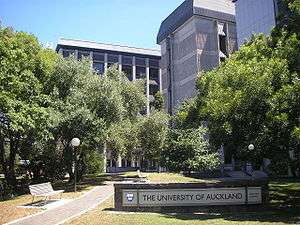
- Faculty of Arts[54]
- Business School[55]
- Faculty of Creative Arts and Industries[56]
- Faculty of Education and Social Work[57]
- Faculty of Engineering[58]
- Auckland Law School[59]
- Faculty of Medical and Health Sciences[60]
- Faculty of Science[61]

Research institutes
Student accommodation
The University of Auckland provides a range of accommodation options for students. Several hundred live in Residential Halls and Apartments, which provide, respectively, food, accommodation, social and welfare services, alongside self-catered, private residences.[65] The University ceased leasing Railway Campus in November 2008.[66]
The University has four residential halls including Grafton Hall, O'Rorke Hall, University Hall–Towers, and Waipārūrū Hall. These halls are full-catered and are aimed at first–year university students.[67]
In addition, the University runs nine self-catered student residences including Te Tirohanga o te Tōangaroa, Carlaw Park Student Village, Grafton Student Flats, 55 Symonds, University Hall–Towers, UniLodge Anzac/Beach, UniLodge Whitaker, Waikohanga House, and the Goldie Estate Homestead on Waiheke Island.[68] These halls and student residences are located in the Auckland CBD area near the university.[69]
Academic staff

Until his death in 2009, the longest serving staff member was Emeritus Professor of Prehistory, Roger Curtis Green, BA BSc (New Mexico), PhD (Harv.), FRSNZ, MANAS. He had been on the staff 1961–66 and from 1973 onwards. The longest serving, non-'retired' staff member is Bernard Brown, ONZM, LLB (Hons) (Leeds), LLM (Sing.). He has been a full-time senior lecturer in the faculty of law 1962-65 and 1969 onwards. William Phillips, the influential economist largely famed for his Phillips curve, taught at the university from 1969 until his death in 1975. The programming language R, widely used by statisticians and data scientists, was developed at the university by Robert Gentleman and Ross Ihaka in the 1990s.
According to the Association of University Staff of New Zealand (AUS) in 2007, New Zealand universities, including the University of Auckland, had been taking a more litigious approach to managing their staff in recent years and engaged lawyers and employment advocates to handle even minor matters. The University of Auckland "paid out more than $780,000 in 2006 to settle problems it listed as including personal grievances and disputes".[70] For example, Paul Buchanan, a popular, world-renowned lecturer on international relations and security, was summarily dismissed in 2007 because a student to whom he sent an email complained that she found his comments about her performance in his class to be offensive.[71] He was later reinstated,[72] but this was just a formality[71] and he never returned to lecturing. As the AUS would not financially support a case for full reinstatement, Buchanan accepted the formal reinstatement and a nominal monetary payout as a settlement of his appeal to the Employment Court.[71]
Student body
| Ethnicity of students[73][74] | 2019 | 2018 | 2017 | 2016 | 2015 | 2014 | 2013 |
|---|---|---|---|---|---|---|---|
| Asian | 19,466 - 45.1% | 18,621 - 43.5% | 17,607 - 41.6% | 16,683 - 39.8% | 16,219 - 38.5% | 15,769 - 37.6% | 15,291 - 37.0% |
| European | 14,570 - 33.8% | 14,985 - 35.0% | 15,587 - 36.8% | 16,095 - 38.4% | 16,771 - 39.8% | 17,372 - 41.4% | 17,451 - 42.2% |
| Pacific Islander | 3,638 - 8.4% | 3,704 - 8.7% | 3,620 - 8.6% | 3,609 - 8.6% | 3,582 - 8.5% | 3,531 - 8.4% | 3,277 - 7.9% |
| Māori | 3,117 - 7.2% | 3,078 - 7.2% | 3,116 - 7.4% | 3,183 - 7.6% | 3,183 - 7.6% | 2,932 - 7.0% | 2,882 - 7.0% |
| MELAA (Middle Eastern, Latin American, African) | 1,579 - 3.7% | 1,559 - 3.6% | 1,460 - 3.4% | 1,389 - 3.3% | 1,349 - 3.2% | 1,327 - 3.2% | 1,267 - 3.1% |
| Other | 778 - 1.8% | 812 - 1.9% | 912 - 2.2% | 907 - 2.2% | 996 - 2.4% | 1,022 - 2.4% | 1,195 - 2.9% |
| Total | 43,148 | 42,759 | 42,302 | 41,866 | 42,100 | 41,953 | 41,363 |
Auckland UniServices
Auckland UniServices Limited is the commercial research and knowledge transfer company for the university.[75]
Rankings
| University rankings | |
|---|---|
| Global – Overall | |
| ARWU World[76] | 201–300 |
| THE World[77] | 179 |
| QS World[78] | 83 |
University rankings
The University of Auckland is New Zealand's leading university. It is the highest ranked New Zealand university in the QS World University Rankings and Shanghai Jiao Tong Academic Ranking of World Universities, and together with the University of Otago is the only university included in the Times Higher Education top 250.[79]
QS World University Rankings
2010 QS World University Rankings[80] ranked University of Auckland 68th overall in the world, scoring very consistently in the subject rankings: 51st in Arts & Humanities, 55th in Engineering & IT, 41st in Life Sciences & Biomedicine, 68th in Natural Sciences and 38th in Social Sciences.
2011 QS World University Rankings[81] ranked the University of Auckland 82nd overall in the world. In the subject rankings, it ranked less than the previous year: 55th in Arts & Humanities, 62nd in Engineering & IT, 50th in Life Sciences & Biomedicine, 73rd in Natural Sciences, 41st in Social Sciences and 33rd in Accounting & Finance.
2014 QS World University Rankings[82] ranked the University of Auckland 92nd overall in the world. In the subject rankings, it continues getting less than previous years for most areas: 91st in Natural Sciences, 66th in Engineering & IT, 74th in Life Sciences & Biomedicine, 30th in Social Sciences and 35th in Arts & Humanities.
2015 QS World University Rankings[83] ranked the University of Auckland 82nd overall in the world. In Faculty rankings, the University was placed 28th in Arts and Humanities, 34th in Social Sciences and Management, 59th in Engineering and Technology, 70th in Life Sciences and Medicine, and 134th in Natural Sciences.
2016 QS World University Rankings ranked the University of Auckland 81st overall in the world. The University of Auckland is ranked first in New Zealand in 35 of the 40 subjects, featuring in the top 50 in 15 subjects: Archaeology (20), Education (23), Development Studies (26), Psychology (29), English Language and Literature (31), Nursing (32), Law (32), Accounting and Finance (34), Geography (38), Civil and Structural Engineering (41), Architecture (44), Anthropology (44), Social Policy (49), Linguistics (49), Business and Management Studies (50).
University Impact Rankings
In 2019, the University of Auckland is ranked Number 1 globally in the inaugural University Impact Rankings by Times Higher Education. The result recognised the University's performance against the United Nations' Sustainable Development Goals, as well as the University's commitment to sustainability and making positive social impacts.[84]
PBRF rankings
The University of Auckland is a research-led university, and had the second highest ranking in the 2006 and 2012 Performance Based Research Fund (PBRF) exercises conducted by the government that evaluated the quality of researchers and research output of all tertiary institutions in New Zealand.
In the previous PBRF evaluation in 2003, when the University was ranked the top research university in New Zealand, the Commission commented: "On virtually any measure, the University of Auckland is the country’s leading research university. Not only did it achieve the highest quality score of any TEO [tertiary education organisation], but it also has by far the largest share of A-rated researchers in the country."[85]
Students' association
The Auckland University Students' Association (AUSA) is the representative body of students, formed in 1891.[86] AUSA publicises student issues, administers student facilities, and assists affiliated student clubs and societies. AUSA produces the student magazine Craccum,[87] and runs the radio station 95bFM.[88] The name of the alumni association is the University of Auckland Society.[89]
CECIL
CECIL (CSL, short for Computer Supported Learning) was the university's learning management and course management system before Canvas and was developed in-house. It had more than 44,000 log-ins per day (2008 April). Cecil support staff worked with academics on research into cheating detections during online assessment,[90] productivity improvement using a learning management system (LMS),[91] and effectiveness of tools in LMS.[92] Cecil contains many of the features of similar systems such as Sakai Project and WebCT. Cecil also provides interactive tools for collaboration and other tools specific to the University.[93] In 2014, a review of learning and teaching technology was initiated, seeking to replace Cecil. The review determined that Canvas (a learning management system developed by Instructure) would be implemented prior to the commencement of the 2016 academic year, and CECIL now acts as an archive for old courses.[94]
The University of Auckland Art Collection
Established in 1966 by Keith Sinclair and Bob Chapman, The Art Collection is one of the University's most valuable and cherished assets.[95] However, its most poignant value lies in its use as a resource for teaching, learning and research. Available on loan to departments and faculties on all campuses, the Collection has been built up over forty years to include major works by significant artists such as Frances Hodgkins, Colin McCahon, Billy Apple and Ralph Hotere.[96] Outcomes from postgraduate research on the Collection have included a thesis on its own history as an entity, monograph exhibitions on individual artists, and surveys of the impact of the evolution of the Collection on Auckland's dealer galleries, resulting in the exhibitions and publications Vuletic and His Circle (about the Petar/James Gallery) in 2003 and New Vision Gallery in 2008.
Controversies
Restructuring measures
In April 2016, Vice-Chancellor Stuart McCutcheon announced that University of Auckland would be selling off its Epsom and Tamaki campuses in order to consolidate education and services at the City, Grafton, and Newmarket campuses. The Epsom Campus is the site of the University of Auckland's education faculty while the Tamaki campus hosts elements of the medical and science faculties as well as the School of Population Health.[97][98]
In mid-June 2018, McCutcheon announced that the University would be closing down and merging its specialist fine arts, architecture, and music and dance libraries into the City Campus' General Library. In addition, the University would cut 100 support jobs. The Vice-Chancellor claimed that these cutbacks would save between NZ$3 million and $4 million a year.[50][51][52] This announcement triggered criticism and several protests from arts faculty and students. Students objected to the closure of the Elam Fine Arts Library on the grounds that it would make it harder to access study materials. Thousands of dissenters circulated a petition protesting the Vice-Chancellor's restructuring policies. Protests were also held in April, May, and June 2018.[99][100][51]
Fossil fuel divestment controversy
Unlike other New Zealand universities such as the University of Otago and Victoria University of Wellington, the University of Auckland has not yet divested from fossil fuels. In April 2017, more than 100 students from the Auckland University Medical Students Association marched demanding the removal of coal, oil and gas from the University's investment portfolio. In May 2017, 14 people from student group Fossil Fuel UoA occupied the Clocktower, urging current Vice Chancellor Professor Stuart McCutcheon to issue a statement in support of divestment from fossil fuels.[101] After twelve hours, they were forcibly removed by police. The following day over two hundred students and staff marched to demand divestment from fossil fuels[102] and more than 240 members of staff from 8 faculties signed an open letter supporting divestment to the Boards of the University of Auckland Foundation and School of Medicine Foundation.[103] Professor McCutcheon has not yet indicated support for fossil fuel divestment.
2019 Hong Kong protest
In 2019, scuffles erupted on the City Campus at the University of Auckland between Chinese students and Hong Kong students.[104][105][106] Lennon Walls were put up by students in support of the 2019–20 Hong Kong protests, but they were then removed by Chinese students with opposing views.[107] The Chinese Consulate praised the patriotism of the Chinese students involved in the scuffles.[108] The New Zealand Police and the University conducted investigations into the incidents.[109][110]
White supremacy
In 2019 the University faced allegations of inactivity against white supremacist groups operating on campus, including their unwillingness to take down posters advertising for a white supremacist group.[111]
Notable alumni and staff
Academia
- Alexandra Brewis Slade, anthropologist
- Margaret Brimble, organic chemist
- Dianne Brunton, ecology academic, professor at Massey University
- Colleen M. Flood, professor at University of Ottawa and Fellow of the Royal Society of Canada
- Rom Harré, Oxford philosopher
- Christian Hartinger, inorganic chemist
- Harry Hawthorn, Canadian anthropologist
- John Hood, former Vice-Chancellor of the University of Oxford
- Charlotte Macdonald, historian
- Diane M. Mackie, social psychologist
- Susan Moller Okin, philosopher
- Peter C. B. Phillips, economist
- Elizabeth Rata, professor of education
- Graham Smith, academic
- Rory Sweetman, historian
- Ronald Syme, pre-eminent New Zealand classicist of the 20th century
- Rorden Wilkinson, political economist
- David Wills, translator of Jacques Derrida
Arts
- Gill Gatfield, sculptor
- Bob Kerr, artist and author
- Rachael McKenna, photographer[112]
- Constant Mews, authority on medieval religious thought
- Cheryll Sotheran, founder of the Museum of New Zealand Te Papa Tongarewa
- Vidyamala Burch, writer and mindfulness teacher
Business
- Vincent Cheng, chairman of HSBC
- Shayne Elliott (born 1963/64), New Zealand banker
- Paul Huljich, CEO of Best Corporation, author
- Ross Keenan (born 1943), businessperson[113]
- Jane Taylor, chair of New Zealand Post and Landcare Research
Film and television
- Philippa Boyens, Academy Award-winning screenwriter
- Niki Caro, film director, producer and screenwriter.
- Jacqueline Feather, screenwriter
- Lucy Lawless, actress
- Christine Tan, CNBC news anchor
- Yasmine Ryan (ca. 1983 – 2017), journalist
Music
- Marcus Chang, Taiwanese singer-songwriter & actor
- Gary Chaw, singer-songwriter
- Gareth Farr, composer
- Tim Finn, musician
- Jeffrey Grice, pianist
- Ashley Lawrence, conductor
- Marya Martin, flautist
- Douglas Mews, early music specialist
- Shirley Setia, singer-songwriter youtuber
- Wilma Smith, Fijian-born concert violinist and music teacher
Politics and law
- Jan Beagle, Under-Secretary-General of the United Nations
- Helen Clark, former Prime Minister of New Zealand, former Administrator of the United Nations Development Programme
- Colin Craig, businessman and leader of the Conservative Party of New Zealand
- Sian Elias, New Zealand Chief Justice 1999-2019
- Jeanette Fitzsimons, New Zealand politician and environmentalist
- Lowell Goddard, Judge[114]
- Jonathan Hunt, former Speaker of the House of Representatives, Order of New Zealand
- Sir Kenneth James Keith, New Zealand Judge appointed to the International Court of Justice
- David Lange, former Prime Minister of New Zealand
- Viliami Latu, Tongan Minister of Police
- Tuilaepa Aiono Sailele Malielegaoi, Prime Minister of Samoa
- Leslie Munro, former New Zealand's permanent representative to the United Nations, former President of the Trusteeship Council, former President of the United Nations General Assembly, three times President of the Security Council
- Winston Peters, politician and leader of the NZ First party
- Anthony Randerson, New Zealand Chief High Court Judge from December 2004 to February 2010. Now a Judge of the New Zealand Court of Appeal
- Mike Rann, former Premier of South Australia, and future Australian High Commissioner to the United Kingdom
- Anand Satyanand, Governor General, New Zealand 2006-2011
- Peter Thomson, Fijian diplomat, Fiji's former Permanent Representative to the United Nations, former President of the General Assembly of the United Nations
- Taufa Vakatale, former Deputy Prime Minister of Fiji
- Vangelis Vitalis, diplomat
- Helen Winkelmann, New Zealand Chief Justice 2019–present
Science and technology
- Sir Vaughan Jones, Fields medallist
- Sir Harold Marshall, acoustician and architect
- Stephen Parke, physicist
- William Sage Rapson, chemist
- Daniel Frank Walls, physicist
- Crispin Gardiner, physicist
- Howard Carmichael, physicist
- Ross Ihaka, statistician
- Penelope Brothers, chemist
Sports
- Jo Aleh (born 1986), sailor, national champion, world champion, and Olympic champion
- Russell Coutts (born 1962), yachtsman
- Mahé Drysdale (born 1978), Australian-born New Zealand rower
- Gavin Hastings (born 1962), Scottish rugby player
- Michael Jones (born 1965), rugby player and coach
- Jerome Kaino (born 1983), American Samoan-born New Zealand rugby player
- Jean Spencer (born 1940), United Kingdom-born New Zealand Olympic gymnast
- Eliza McCartney (born 1996), New Zealand Olympic pole vaulter
Demographics
| Year | Pop. | ±% p.a. |
|---|---|---|
| 2006 | 96 | — |
| 2013 | 111 | +2.10% |
| 2018 | 105 | −1.11% |
| Source: [115] | ||
The statistical area of Auckland-University, which covers the city campuses of the University of Auckland and the Auckland University of Technology, had a population of 105 at the 2018 New Zealand census, a decrease of 6 people (-5.4%) since the 2013 census, and an increase of 9 people (9.4%) since the 2006 census. There were 63 households. There were 57 males and 48 females, giving a sex ratio of 1.19 males per female. The median age was 29.2 years, with 6 people (5.7%) aged under 15 years, 54 (51.4%) aged 15 to 29, 39 (37.1%) aged 30 to 64, and 6 (5.7%) aged 65 or older.
Ethnicities were 28.6% European/Pākehā, 8.6% Māori, 5.7% Pacific peoples, 62.9% Asian, and 11.4% other ethnicities (totals add to more than 100% since people could identify with multiple ethnicities).
The proportion of people born overseas was 80.0%, compared with 27.1% nationally.
Although some people objected to giving their religion, 45.7% had no religion, 25.7% were Christian, and 28.6% had other religions.
Of those at least 15 years old, 54 (54.5%) people had a bachelor or higher degree, and none had no formal qualifications. The median income was $30,200. The employment status of those at least 15 was that 45 (45.5%) people were employed full-time, 18 (18.2%) were part-time, and 6 (6.1%) were unemployed.[115]
References
- "Our history: Key developments 1883-2000s". The University of Auckland. Retrieved 18 April 2018.
- "Officers of the University". University Calendar. The University of Auckland. Retrieved 18 April 2018.
- "Annual Report 2015" (PDF). Retrieved 25 March 2017.
- Heritage Sites to Visit: Auckland City. Heritage New Zealand. Retrieved 6 November 2008.
- "Key developments 1883-2000s - The University of Auckland". www.auckland.ac.nz. Retrieved 19 April 2020.
- McLintock, A.H., ed. (1966). "Education, University – University of New Zealand". An Encyclopaedia of New Zealand. Retrieved 10 December 2013.
- "Buildings – FMHS History". fmhs-history.blogs.auckland.ac.nz. University of Auckland Faculty of Medical and Health Sciences. Retrieved 10 July 2020.
- "Brief history of the collections". www.library.auckland.ac.nz. University of Auckland Libraries and Learning Services. Retrieved 10 July 2020.
- "Faculty history". University of Auckland Faculty of Education and Social Work. Archived from the original on 22 January 2019. Retrieved 11 March 2019.
- Maharey, Steve (29 July 2004). "Auckland University and Auckland College of Education to merge". Beehive.govt.nz. New Zealand Government. Archived from the original on 11 March 2019. Retrieved 11 March 2019.
- "Epsom Campus". University of Auckland Faculty of Education and Social Work. Archived from the original on 23 January 2019. Retrieved 13 March 2019.
- "Our campuses". University of Auckland Faculty of Education and Social Work. Retrieved 13 March 2019.
- "Professor Stuart McCutcheon". University of Auckland. Retrieved 8 April 2019.
- "Equality for NZ just what the doctor ordered". The New Zealand Herald. 2 September 2013. Archived from the original on 5 January 2014. Retrieved 8 April 2019.
- "Welcome to our new Vice-Chancellor". University of Auckland. Retrieved 16 March 2020.
- "Accreditations". www.auckland.ac.nz. University of Auckland. Retrieved 10 July 2020.
- "$1b Auckland Uni expansion on the books". The New Zealand Herald. 18 June 2013.
- "University plans $240m medical faculty upgrade0". The New Zealand Herald. 12 May 2009.
- Gibson, Anne (21 January 2014). "Rebuild of old Lion Breweries site underway for university". The New Zealand Herald. Retrieved 18 April 2018.
- "New science facilities opened at University of Auckland". Education Central. 29 August 2017.
- "Dawn of a new era at the Faculty of Engineering". Scoop Independent News. 6 December 2019.
- "Work starts on new $116m university medical school building in Grafton". The New Zealand Herald. 27 November 2017.
- "Green light for rec centre". Ingenio. 19 October 2018.
- "Recreation and Wellness Centre redevelopment". The University of Auckland.
- "University of Auckland now biggest in student accomodation [sic]". Scoop Independent News. 4 November 2019.
- "Uni. of Auckland Management". Archived from the original on 10 February 2013. Retrieved 17 December 2012.
- "Arms of the University of Auckland". University Calendar. The University of Auckland. Retrieved 18 April 2018.
- "Shutting The University Doors – Students Say NO". Scoop News. Retrieved 17 June 2015.
- "National Certificate of Educational Achievement (NCEA) Level 3 – The University of Auckland". www.auckland.ac.nz. Retrieved 17 June 2015.
- "Minimum overseas entry requirements – The University of Auckland". www.auckland.ac.nz. Retrieved 17 June 2015.
- "General information about entry requirements". The University of Auckland. Retrieved 20 July 2009.
- "National Certificate of Educational Achievement (NCEA) Level 3 – The University of Auckland". www.auckland.ac.nz. Retrieved 17 June 2015.
- "English language requirements". The University of Auckland. Retrieved 20 July 2009.
- "Campus locations". University of Auckland. Retrieved 31 March 2019.
- "Tāmaki Innovation Campus". University of Auckland. Archived from the original on 22 January 2019. Retrieved 31 March 2019.
- "Epsom Campus". University of Auckland. Retrieved 31 March 2019.
- "Faculty history". University of Auckland Faculty of Education and Social Work. Archived from the original on 22 January 2019. Retrieved 31 March 2019.
- "Auckland Uni confirms brewery site buy". 3 News. 23 April 2013.
- "Why choose Tai Tokerau Campus?". University of Auckland. Retrieved 8 April 2019.
- "University's new southside home". Newsroom. Retrieved 25 June 2020.
- Alcock, Gil (20 July 2011). "Goldwaters' gift to uni". stuff.co.nz. Retrieved 31 January 2012.
- "Auckland Uni begins the year smoke free". 3 News. 1 March 2010. Archived from the original on 20 October 2011.
- "Auckland's UniServices sets innovation institute in China". Otago Daily Times. 24 November 2016.
- "University of Auckland Innovation Institute China established". The New Zealand China Trade Association. Retrieved 25 January 2017.
- "University Innovation Institute China seizes opportunities". Scoop. 19 May 2017.
- "University of Auckland launches new Aulin College in China". Education New Zealand. Retrieved 17 October 2019.
- "New college from international partnership between universities". The University of Auckland. Retrieved 4 September 2019.
- "New college from international partnership". Scoop. 5 September 2019.
- "Libraries and Learning Services". University of Auckland. Retrieved 8 April 2019.
- Robinson, Amanda Jane (21 June 2018). "Auckland University confirms library closures despite huge protests". Newshub. Archived from the original on 31 March 2019. Retrieved 11 March 2019.
- Furley, Tom; Smith, Anneke (21 June 2018). "Heated rally against shut uni libraries: 'It means the death of fine arts'". Radio New Zealand. Archived from the original on 19 January 2019. Retrieved 11 March 2019.
- "Three specialist libraries to close at University of Auckland, 45 jobs to go". The New Zealand Herald. 21 June 2018. Archived from the original on 8 April 2019. Retrieved 8 April 2019.
- "General Library Special Collections". University of Auckland. Retrieved 8 April 2019.
- "Arts". University of Auckland. Retrieved 31 March 2019.
- "Business School". University of Auckland. Retrieved 31 March 2019.
- "Creative Arts and Industries". University of Auckland. Retrieved 31 March 2019.
- "Education and Social Work". University of Auckland. Retrieved 31 March 2019.
- Faculty of Engineering. The University of Auckland. Retrieved on 6 November 2008.
- "Auckland Law School". University of Auckland. Retrieved 31 March 2019.
- "Medical and Health Sciences". University of Auckland. Retrieved 31 March 2019.
- "Faculty of Science". University of Auckland. Retrieved 31 March 2019.
- "Our history". Auckland Bioengineering Institute, University of Auckland. Retrieved 31 March 2019.
- "The Liggins Institute". University of Auckland. Retrieved 31 March 2019.
- "Public Policy Institute". University of Auckland. Retrieved 31 March 2019.
- "600 more beds at University of Auckland - The University of Auckland". www.auckland.ac.nz. Retrieved 22 November 2015.
- Gibson, Anne (7 November 2008). "Uni quits Railway Campus over repairs". The New Zealand Herald. Retrieved 25 November 2011.
- "Halls of residence general information". University of Auckland. Retrieved 31 March 2019.
- "Self-catered accommodation". University of Auckland. Retrieved 16 February 2020.
- "University accommodation map" (PDF). University of Auckland. Retrieved 31 March 2019.
- "AUS tertiary update". Scoop News. Association of University Staff of New Zealand. 11 October 2007. Retrieved 28 April 2012.
- "Paul Buchanan's employment at Auckland Uni ends". Scoop News. 28 September 2010. Retrieved 28 April 2012.
- Gay, Edward (20 September 2008). "Sacked lecturer reinstated". The New Zealand Herald. Retrieved 1 February 2012.
- "Annual Report 2018" (PDF). The University of Auckland. p. 9. Retrieved 23 April 2019.
- "Annual report" (PDF). The University of Auckland. 21 May 2020. p. 9.
- Auckland UniServices Archived 15 February 2012 at the Wayback Machine. Auckland UniServices Limited. Retrieved on 18 July 2009.
- "The University of Auckland | Academic Ranking of World Universities - 2018 | Shanghai Ranking - 2018". Shanghai Ranking. Retrieved 19 February 2019.
- "University of Auckland". Times Higher Education (THE). 10 May 2018.
- "The University of Auckland". Top Universities. 16 July 2015.
- "New Zealand's world-ranked University". www.auckland.ac.nz. University of Auckland. Retrieved 10 July 2020.
- "QS World University Rankings 2010 Results".
- QS World University Rankings 2015/16. Top Universities. Retrieved on 1 October 2015.
- "QS World University Rankings (2014/15)". QS Quacquarelli Symonds Limited. 2014. Retrieved 21 September 2014.
- "QS World University Rankings (2015/16)". QS Quacquarelli Symonds Limited. 2015. Retrieved 19 September 2015.
- "University Impact Rankings 2019". Times Higher Education. 2019.
- "Full report" (PDF). Archived from the original (PDF) on 14 October 2008. Retrieved 23 August 2008. (174 KB)
- "What We Do – AUSA". Retrieved 10 July 2020.
- "Craccum Magazine to Throw Off the Chains of Democracy". Critic - Te Arohi (5). 2019. Retrieved 10 July 2020.
- "Student radio network". www.nzonair.govt.nz. NZ on Air. Retrieved 10 July 2020.
- "The University of Auckland Society". www.auckland.ac.nz. University of Auckland. Retrieved 10 July 2020.
- Detecting Cheaters using a Learning Management System. Cecil. Retrieved 6 November 2008.
- Increasing Teaching Productivity with EuropeMMM. Cecil. Retrieved 6 November 2008.
- On-Line Course Surveys: Do Incentives Work. Ed/ITLib Digital Library, AACE. Retrieved 6 November 2008.
- Cecil Training. Cecil. 6 November 2008.
- "University improvements - The University of Auckland". www.auckland.ac.nz. Retrieved 22 November 2015.
- Dunn, Michael. The University of Auckland. Auckland: Woolmore Publishing,1983.
- Dunn, Michael. "The University of Auckland". Art New Zealand. Number 26, Autumn 1983: 48
- "Auckland Uni to sell Tamaki Campus". The New Zealand Herald. 11 April 2016. Retrieved 11 March 2019.
- "Auckland University sells Tamaki campus to developer Tim Edney". National Business Review. 11 April 2016. Retrieved 11 March 2019.
- Garwood, Annabella (30 April 2018). "Emotions high as Auckland University students protest library closure". Newshub. Archived from the original on 31 March 2019. Retrieved 11 March 2019.
- Bateman, Sophie (17 May 2018). "Huge protests at Auckland University over library closures". Newshub. Archived from the original on 19 May 2018. Retrieved 11 March 2019.
- "Students occupy University of Auckland, demanding divestment from fossil fuels". Stuff. Retrieved 18 April 2018.
- "Hundreds of students, staff march for divestment". Scoop News. Retrieved 18 April 2018.
- "Staff Open Letter to the UoA Foundation". Retrieved 18 April 2018.
- "Scuffle at Auckland University over Hong Kong extradition bill". stuff.co.nz. Retrieved 30 July 2019.
- "Heated Hong Kong protest at Auckland University". stuff.co.nz. Retrieved 2 October 2019.
- "Female activist knocked to the ground as Hong Kong, China tensions spill over at University of Auckland". 1 News. Retrieved 30 July 2019.
- "University of Auckland Lennon Wall 'vandalised' following protest". stuff.co.nz. Retrieved 7 August 2019.
- "China Consulate praises 'patriotism' of students in UoA scuffle". MSN News. Retrieved 1 August 2019.
- "Police probe incident during Hong Kong demonstration at Auckland Uni". Radio New Zealand. Retrieved 1 August 2019.
- "Uni wraps up investigation into Hong Kong protest". Newsroom. Retrieved 16 August 2019.
- Scotcher, Katie (2 October 2019). "Open letter denounces white supremacy at Auckland University". Radio New Zealand.
- Cook, Marjorie (18 December 2017). "How to photograph cats and dogs: Wanaka portrait artist Rachael McKenna explains". Stuff. Retrieved 16 February 2020.
- Lambert, Max; Traue, James Edward; Taylor, Alister (1991). Who's Who in New Zealand, 1991 (12th ed.). Auckland: Octopus. p. 336. Retrieved 6 May 2020.
- "Profile: Justice Lowell Goddard". BBC. 4 February 2015. Retrieved 4 February 2015.
- "Statistical area 1 dataset for 2018 Census". Statistics New Zealand. March 2020. Auckland-University (134800). 2018 Census place summary: Auckland-University
Sources
- A Complete Guide To Heraldry by A.C. Fox-Davies 1909.
External links
| Wikimedia Commons has media related to University of Auckland. |
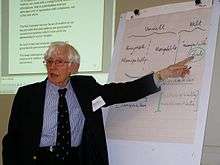


.jpg)
.jpg)
.jpg)